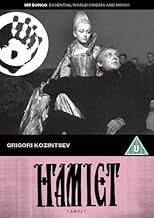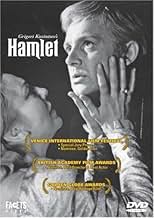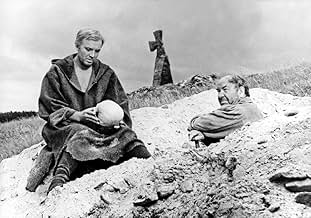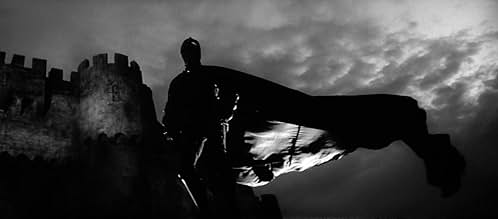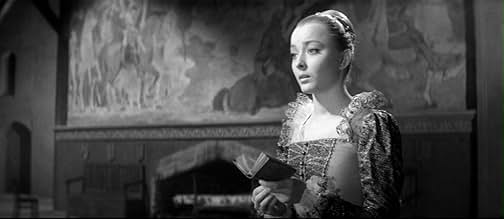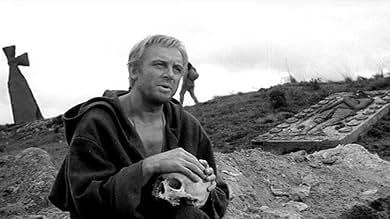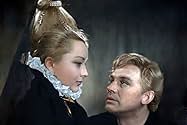IMDb RATING
8.2/10
3.1K
YOUR RATING
After the death of the King of Denmark - Hamlet's father - his brother Claudius ascends the throne, who takes his widow Gertrude as his wife. Hamlet meets the ghost of his father and learns ... Read allAfter the death of the King of Denmark - Hamlet's father - his brother Claudius ascends the throne, who takes his widow Gertrude as his wife. Hamlet meets the ghost of his father and learns that he was killed by Claudius.After the death of the King of Denmark - Hamlet's father - his brother Claudius ascends the throne, who takes his widow Gertrude as his wife. Hamlet meets the ghost of his father and learns that he was killed by Claudius.
- Director
- Writers
- Stars
- Nominated for 2 BAFTA Awards
- 5 wins & 6 nominations total
Innokentiy Smoktunovskiy
- Hamlet
- (as I. Smoktunovskiy)
Mikhail Nazvanov
- Claudius korol
- (as M. Nazvanov)
Elza Radzina
- Gertrude koroleva
- (as E. Radzin)
Yuriy Tolubeev
- Polonius
- (as Yu. Tolubeyev)
Anastasiya Vertinskaya
- Ophelia
- (as A. Vertinskaya)
Vladimir Erenberg
- Horatio
- (as V. Erenberg)
Stepan Oleksenko
- Laertes
- (as S. Oleksenko)
Vadim Medvedev
- Guildenstern
- (as V. Medvedev)
Igor Dmitriev
- Rosencrantz
- (as I. Dmitriyev)
Aadu Krevald
- Fortinbras
- (as A. Krevald)
Viktor Kolpakov
- Mogilshchik
- (as V. Kolpakov)
Aleksandr Chekayevskiy
- Perviy akter
- (as A. Chekayevsky)
Rein Aren
- Lucianus- vtoroy akter
- (as R. Aren)
Yuriy Berkun
- Tretiy akter
- (as Yu. Berkun)
Ants Lauter
- Svyashchennik
- (as A. Lauter)
- Director
- Writers
- All cast & crew
- Production, box office & more at IMDbPro
Featured reviews
I share the previous reviewer's high estimation of this wonderful film. It is a highly political and imaginative interpretation of Hamlet, making Hamlet a man of action who is nevertheless alienated at court. The opening sequence is a stunning interpretation of Hamlet's view that the time is out of joint--Hamlet rushes back to court on horseback even as the flags of mourning are being unfurled. Claudius's speech is delivered by a herald and then translated by ambassadors. When we get to Claudius giving the rest of it to his court, it's not clear how much time, if any, has passed. nor is it clear who is in command (who is giving the orders that the flags be unfurled, cannons fired, the proclamation read, and so on). When Claudius finally addresses Hamlet aft the camera tracks him moving right down the table of courtiers, Hamlet's chair is empty. the opening sequence also moves from open external spaces ( a shot of the sea, a long shot of the land, and moves to increasingly shut in , interior spaces (the castle gates drop as the music gets ominous) to suggest that Denmark is indeed a prison. Visually and musically the film is very rich. I would rank this as the best of the filmed Hamlets.
Hamlet (1964) (original title Gamlet) is a Russian adaptation of Shakespeare's play, directed by Grigori Kozintsev. The film stars Innokentiy Smoktunovskiy as Hamlet, and Anastasiya Vertinskaya as Ophelia.
I saw this movie as part of a Shakespeare in Film honors seminar that I'm auditing. It surprised me that I enjoyed this version of Hamlet so much. After all, it was filmed 50 years ago, in black and white, mainly in Estonia, during a period when the Soviet government was monitoring every frame of every movie for possible deviation from the politically acceptable.
Nonetheless, the movie worked for me. Elsinore Castle--artificially constructed, as I learned from IMDb--looked very realistic. Also, the castle had life in and around it. When you think about it, most film Hamlets are shot almost in a vacuum. You don't get any sense that anyone lives in or works in the castle. This Hamlet is the exception-- extras are everywhere, working hard and keeping the castle functioning.
The acting is generally excellent. I was particularly impressed by Anastasiya Vertinskaya (Ophelia). She went on to become a noted Russian film star. This role was a turning point in her career. She's extraordinarily talented. She acts--and appears--like someone who belongs in the setting. She doesn't have the buffed, "I am a star" attitude of many women who play Ophelia.
Prince Hamlet tells us that, to him, Elsinore is like a prison. Kozintsev emphasizes this aspect of the castle. In the beginning of the film, the portcullis closes ominously. Even if you don't know the plot of Hamlet, you know that trouble is ahead after you've seen the first few frames.
Some of he students felt that seeing Shakespeare in translation just doesn't make sense. After all, Shakespeare is the greatest master of the English language. Boris Pasternak apparently translated Shakespeare's language into Russian, but that doesn't help us. I would have thought that the subtitles who have reverted to Shakespeare's English, but they don't. Unless you speak Russian, you have no idea of what the Russian audience is hearing.
Does that mean that all that's left (for us) is the plot? Some of the students thought so, but I disagree. There's a third element besides language and plot--character. Hamlet, Claudius, Gertrude, Polonius, and Ophelia all have a distinct character, set down by Shakespeare for us to understand and interpret. I think that in this movie, even though we lose language, Kozintsev allows us to see character. So, even without Shakespeare's language, this film has much to offer us. (Music by Dmitri Shostakovich is an added bonus.)
I saw the movie on the small screen, where it worked pretty well. It would work better in a theater. If it's not playing in revival, watch it on DVD. It's definitely worth seeing, and I highly recommend it.
I saw this movie as part of a Shakespeare in Film honors seminar that I'm auditing. It surprised me that I enjoyed this version of Hamlet so much. After all, it was filmed 50 years ago, in black and white, mainly in Estonia, during a period when the Soviet government was monitoring every frame of every movie for possible deviation from the politically acceptable.
Nonetheless, the movie worked for me. Elsinore Castle--artificially constructed, as I learned from IMDb--looked very realistic. Also, the castle had life in and around it. When you think about it, most film Hamlets are shot almost in a vacuum. You don't get any sense that anyone lives in or works in the castle. This Hamlet is the exception-- extras are everywhere, working hard and keeping the castle functioning.
The acting is generally excellent. I was particularly impressed by Anastasiya Vertinskaya (Ophelia). She went on to become a noted Russian film star. This role was a turning point in her career. She's extraordinarily talented. She acts--and appears--like someone who belongs in the setting. She doesn't have the buffed, "I am a star" attitude of many women who play Ophelia.
Prince Hamlet tells us that, to him, Elsinore is like a prison. Kozintsev emphasizes this aspect of the castle. In the beginning of the film, the portcullis closes ominously. Even if you don't know the plot of Hamlet, you know that trouble is ahead after you've seen the first few frames.
Some of he students felt that seeing Shakespeare in translation just doesn't make sense. After all, Shakespeare is the greatest master of the English language. Boris Pasternak apparently translated Shakespeare's language into Russian, but that doesn't help us. I would have thought that the subtitles who have reverted to Shakespeare's English, but they don't. Unless you speak Russian, you have no idea of what the Russian audience is hearing.
Does that mean that all that's left (for us) is the plot? Some of the students thought so, but I disagree. There's a third element besides language and plot--character. Hamlet, Claudius, Gertrude, Polonius, and Ophelia all have a distinct character, set down by Shakespeare for us to understand and interpret. I think that in this movie, even though we lose language, Kozintsev allows us to see character. So, even without Shakespeare's language, this film has much to offer us. (Music by Dmitri Shostakovich is an added bonus.)
I saw the movie on the small screen, where it worked pretty well. It would work better in a theater. If it's not playing in revival, watch it on DVD. It's definitely worth seeing, and I highly recommend it.
10dmeltz
I have to marvel at the production values in this wonderful film. Exquisite sets, lighting and costumes. Stunning location. Epic original music score by Dmitri Shostokovitsch -- the music alone is more than enough to recommend this film. Great acting by, among others, Innokenti Smoktunovsky as Hamlet. Every scene an artistically complete poem of light and sound. Oh, and if you wonder what it's like to hear Shakespeare in Russian . . . it's great! The translation is by Boris Pasternak, one of the finest poets in any language. An epic treatment of the epic story.
impressive. strange. monumental. subtle. wall of music, nuanced performances, Shakespeare play heart and Slav soul. it is an adaptation but in a strange manner. because out of words and images, out of Smoktunovski performance it is small light of mystery. that is its virtue. that sparkle like descending in heart of a world of shadows and ash. and the actors, the real actors, are Sostakovici music,the Russian language, the profound feeling front to a masterpiece. it is pure delight. with cinnamon flavor and salt taste. like an ice flower. or like looniest song.it is a dark large desert in night. and, in same measure, sand rope of existence like ladder to fundamental answer about art of unforgettable search of yourself. and Elisabethan costumes completed by Mikhail Nazvanov as Claudius - alter ego for a Henry VIII Philipp II of Spain or Anastasia Vertinskaya as Ophelia - prey of spider web - veil.
I have first seen Kozintsev's Hamlet back in 1963 and saw it again yesterday, as part of my job as music critic in a São Paulo newspaper, for the commemoration of Shostakovich's centennial -- he is the author of the soundtrack. The film has not aged, it is still one of the most beautiful adaptations of Shakespeare tragedy, Smoktunovsky's acting is thrilling and Shostakovich's soundtrack is marvelous. His irony reveals itself in the way he accompanies the scene at the graveyard: Hamlet's bittersweet dialog with the gravedigger (what an actor!) and his sad monologue about frailty having in his hand's Yorick's skull. A great film!
Did you know
- TriviaConsidered by John Gielgud and Kenneth Branagh to be the definitive screen adaptation of the play according to a New York Times profile of lead actor Smoktunovsky.
- GoofsDuring the first round of fencing between Hamlet and Laertes, there is a brief shot in which they are suddenly missing their vests. This occurs two minutes before the shot where they both remove their vests, in preparation for the second round.
- ConnectionsFeatured in Kino (1971)
- How long is Hamlet?Powered by Alexa
Details
- Runtime2 hours 28 minutes
- Color
- Sound mix
- Aspect ratio
- 2.35 : 1
Contribute to this page
Suggest an edit or add missing content


